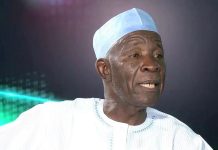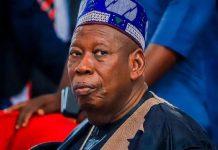One thing that has been peculiar in Nigeria’s ministry of environment is the way its leadership has changed, in quick successions.
In these three years, two ministers appointed to head the ministry have resigned to take up other jobs they prioritised.
Amina Mohammed, currently deputy secretary general of the United Nations, was the first to be appointed in November 2015 by President Muhammadu Buhari. Her leadership lasted only a year.
She served in the position until December 2016 when she tendered her resignation to take up her UN top Job.
The minister of state, Ibrahim Jibril, who held sway to the saddle afterwards, also resigned this month, after he was selected to ascend the throne of Emir of Nasarawa.
A geographer, Mr Jibril’s two-year stint would later be known for his stand on preserving Nigeria’s natural resources.
On December 13, Mr Buhari, again appointed a Surveyor, Suleiman Hassan, as the minister of environment. Until his appointment, Mr Hassan was the minister of state in the Federal Ministry of Power Works and Housing.
It will be safe to assess the strides of the ministry under Ms Mohammed and Mr Jibril since Mr Hassan was only appointed a few weeks ago.
Both officials under review recorded quite a number of breakthroughs, such as major policies on climate change, but one event worthy of note during Ms Mohammed’s stint is the battle over the control of the Ecological Fund.
Few months to her resignation, Ms Mohammed opposed a bill proposed by the Attorney General of the Federation and minister of justice, Abubakar Malami, putting the management of the Fund under the Office of the Secretary to the Government of the Federation.
She demanded that it should be placed under her ministry.
The Ecological Fund, currently managed by the presidency, is an intervention facility set aside to tackle the multifarious ecological problems ravaging communities across the country.
Such problems include soil erosion, drought, desertification, oil spillage, pollution, general environmental pollution, storm, tornadoes, bushfire, large-scale livestock and crop epidemic, crop pest, landslide and earthquakes which are mainly the environmental challenges the country is facing and normally should fall under the purview of the environment ministry.
Presidency insiders had said the standoff between the officials stalled the processes for the creation of the Ecological Fund Authority, which would have provided a major solution to some of the environmental hazards in the country.
Meanwhile, here are some key policy initiatives of the ministry and how they have succeeded and or failed:
Major Promises:
1. Clean up of Ogoni Land: Ogoni area in Rivers State has over the years been destroyed by oil leaks leading to the destruction of surrounding waters and farmlands. A UNEP report after a scientific study recommended total clean-up of the environment.
Shortly after his assumption of office in 2015, President Buhari launched the cleanup exercise. The Ogoni Project was to be carried out by the environment ministry and development partners. Specimens were said to have been taken for analysis.
Achievements:
Ogoni Trust Fund was set up.
About $180 million was mobilised from oil companies for the clean-up. UNEP in its report had recommended that funds for the clean-up be largely provided by the oil firms who extracted oil from the communities, especially Shell.
Failure:
Despite official claims and funds raised, the clean-up was yet to start three years after.
Hundreds of activists and civil society organisations (CSOs) late in November barricaded the Abuja head office of the Ministry of Environment in Abuja over delays in the commencement of the oil spill cleanup.
It was only when Mr Jibril was about to exit office as the environment minister that he announced that the clean up was finally set to start.
2. Ending open defecation and indiscriminate waste disposal – The ministry, as well as waste management authorities, made plans of turning waste into wealth through an Integrated Waste Management System. Also, there were plans to end open defecation.
Achievements:
The ministry designed a waste management framework. Few states were identified to pilot test the scheme with one waste recycling plant each in an agreement entered into with the states and investors on a public-private partnership arrangement.
The federal government provided N250 million to the pilot states to kick-start the project. The government approved and developed a national policy for the declaration of national emergency in open defecation.
Failures: Indiscriminate dumping of refuse has gone unchecked, leading to an increase in illegal dump sites across the country.
Beside Lagos that operates a form of waste recycling which is mostly managed by private firms, no other state has a waste recycling system yet, despite laid out plans.
Reports suggests Nigeria uses the least preferred waste management option – disposal in open dumpsites that are often set on fire, causing air pollution.
Open defecation, which, according to experts, usually provokes the outbreak of waterborne diseases such as cholera and dysentery, has also gone unchecked. The eyesores have increasingly become a common sight even in urban areas across the country.
Nigeria is currently the country with the largest number of people that defecate in the open in Africa and second largest globally after India.
3. To address concerns of climate change and Natural disasters – Environmental matters was to be added in the concurrent list so as to prioritise tackling disasters such as drought and desertification, biodiversity loss, deforestation, land degradation, flood and erosion, pollution, sanitation and waste management.

Achievements:
– A bill to provide a legal framework for mainstreaming of climate change responses and actions into government policy was passed. Nigeria became the 146th country to endorse the Paris Climate Change agreement.
– Nigeria partnered with other Lake Chad basin countries to address the challenges of drying up of the lake which poses adverse consequences on the people and the ecosystem.
– Carried out a comprehensive national survey of ecological zones variations, scope and severity of soil erosion and flood control sites across the country. The survey updated the Federal Government’s data bank on ecological problems.
Failures:
– Desertification appears to have worsened despite plans and funds put in place. An estimate of between 50 per cent to 75 per cent of 11 Northern states are affected by desertification and are particularly vulnerable to wind erosion in 2018, according to researchers.
– Environmental matters yet to be added under concurrent list as the challenge worsens. This year alone, Nigeria was hit with flooding at almost the same level as 2012 when the country was worse hit. It prompted the emergency body, NEMA, to declare national disaster in four most affected states.
-Scores of lives were lost. Houses had been submerged with properties worth millions destroyed and many displaced.
– Little was done to tackle pollution, especially the emission of greenhouse gases as the country now has the highest burden of fatalities from air pollution in Africa and 4th globally.
– A 2018 report found over 2,800 active erosion sites in the South-East of Nigeria.
Other Promises
-To ensure that the environment sector becomes a major revenue earner for the country.
-That the ministry and states would establish reliable electronic-based data bank on Pollution Control and Waste Management issues in the country.
-To formulate policies that will regulate the environment sector as well as implement programmes and projects that will conserve and preserve the nation’s natural resources.
Achievements:
– Nigeria, under the ministry, formally joined the Elephant Protection Initiative (EPI), a coalition of African countries dedicated to sustainable conservation of elephants and ending of the ivory trade.
-The National Council on Environment (NCE), under the ministry of environment, recommended a ban on the exportation of charcoal in Nigeria.
-The ministry resolved to domesticate Minamata Convention on Mercury and other Multilateral Environmental Agreements (MEAs) ratified by Nigeria.
-Flagged-off a Climate Change Knowledge Immersion Workshop in Ogun State.
Failures:
-Yet to establish the electronic-based data bank on Pollution Control and Waste Management issues in the country.
– No strong policy yet to tackle either refuse dump or construction of illegal structures blocking waterways across the country







